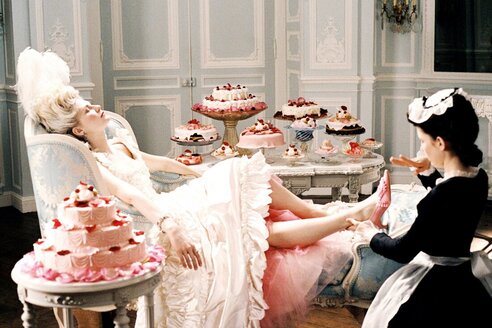B | The last queen of France deals with a distant husband and a whispering court. Directed by Sofia Coppola Starring Kirsten Dunst, Jason Schwartzman, and Rose Byrne Review by Jon Kissel |

If Coppola wanted to do that, the world would miss out on her future work but nothing greater that that would be lost or taken from society. For Marie Antoinette to do so is a different story. Her household budget is money that could be spent anywhere else, or not collected from the third estate in the first place. There are no scenes of the average French peasant struggling in the countryside during the period of particular privation that existed in this timeframe, brought on by bad weather and clumsy mismanagement. The film leaves it up to the viewer to calculate how many loaves of bread could be made for the worth of one of Marie Antoinette’s dresses that will be worn once and hang in a closet for the rest of its life. Her bubble is the film’s. I’ve seen Marie Antoinette several times, and this viewing was focused on any side-eye that Coppola weasels in. It’s there in her nonchalance when told about how her conscience-absolving charities are suffering amidst her overspending, to which she responds that she’ll ask her husband Louis XVI (Jason Schwartzman) to cover the difference. A few shots are saved for the help that exists to either prepare the way for Marie Antoinette or to clean up in her wake. The cluttered aftermath of a party, all melted cream and candlewax, is slowly taken in, while my favorite scene of the film takes place at the queen’s fake cottage, where she allows herself to pretend she’s the wife of a farmer. The morning’s eggs are cleaned off and put back in their nests before Marie Antoinette and her daughter arrive to collect them, spared any interaction with the less-than pristine conditions that prop up her idyllic existence.
Coppola is ultimately uninterested in skewering her lead because there’s so much else here in need of skewering. A more thoughtful queen is not what this situation requires or would accept. The political stakes for her are to produce male heirs. Anything beyond that is out of her job description. The film implies that she’s smart enough to understand this and doesn’t pointlessly fight against the status quo. She’s left to navigate various no-win scenarios. Freeze out Louis XV’s (Rip Torn) mistress (Daria Argento) and endear yourself to the catty princesses (Molly Shannon and Shirley Henderson). Say a single remark to her and calm a potential scandal, but set the princesses to slander. Find peace at your cottage, but alienate the court who lives on favors and the order on which they’re greeted in the morning. She’s the subject of whispers about her spending and vapidity, while the king hunts and fiddles with locks and spends vastly more than the queen’s gambling budget on foreign adventurism in America whose main purpose is not the furtherance of any national interest but the embarrassment of another great power. The film doesn’t have in its head the ability to say the Revolution was correct and inevitable and wholly justified, but there is enough here to say that Coppola at least has no wish to elevate the world of the film beyond the seductive appeal of wealth that someone like Martin Scorsese frequently indulges in.
There had to have been some way for Coppola to more rigorously incorporate a critique or a hint at the righteous fury that’s building within France, because there are few films that I’d like to praise more than this one. This is as good as it gets for Coppola in regards to costuming and set design, thanks in part to the full cooperation of Versailles. Within this state of total opulence, she and cinematographer Lance Acord put together one stunning tableau after another, each worthy of the same kind of artistic immortalization that hangs on the Versailles walls. Dunst is incredibly magnetic and Schwartzman is fully dedicated to making Louis as awkward and pathetic as the real Louis XVI. The extensive supporting cast feels exactly right in their comfort level with this world and their ability to fit into it, from Torn’s lecherous king to Jamie Dornan’s swagger as a dashing war hero. I want to elevate this film to the highest plain of praise because Coppola’s a major 21st century auteur and this could credibly be at the top of her filmography.
Ultimately, I just know too much about this period of history to turn that part of my brain off. Setting aside the details that the film weirdly gets wrong, like the number of children she had and when they died or the much more dramatic circumstances of the uprising depicted late in the film, it’s simply impossible for me to be onboard with the film’s premise. There is a lay reading of Marie Antoinette that finds sympathy for her as an individual, but the long process that will lead to her ignominious end removes her individuality and makes her body into a collection of political power, in the same way everyone in the court is not a person but a manifestation of the state. Therefore, ripping her to shreds, as the participants in the uprising would surely have done if they caught her at Versailles, would not have been grisly murder as much as it would have been political rebellion on the part of people who have no other recourse to power. This is the world that the French monarchy created on purpose, and its fracturing is not cause for concern but praise. No amount of filmmaking can overpower that essential truth. B
 RSS Feed
RSS Feed